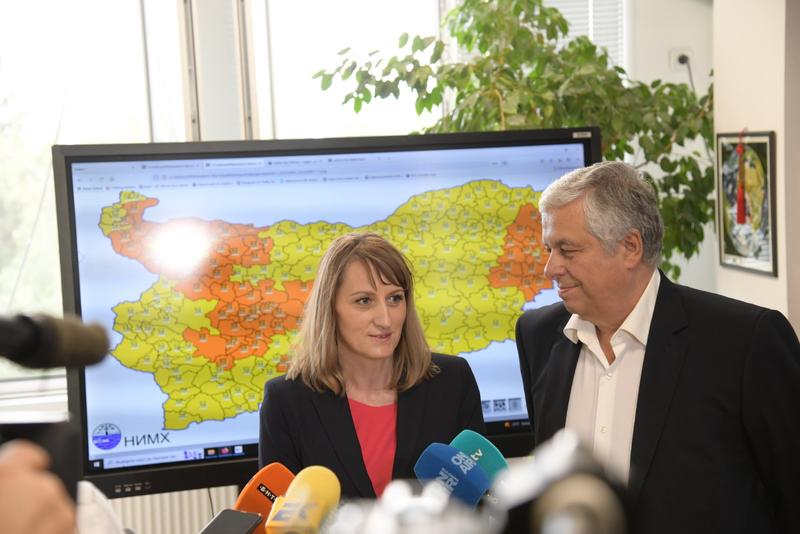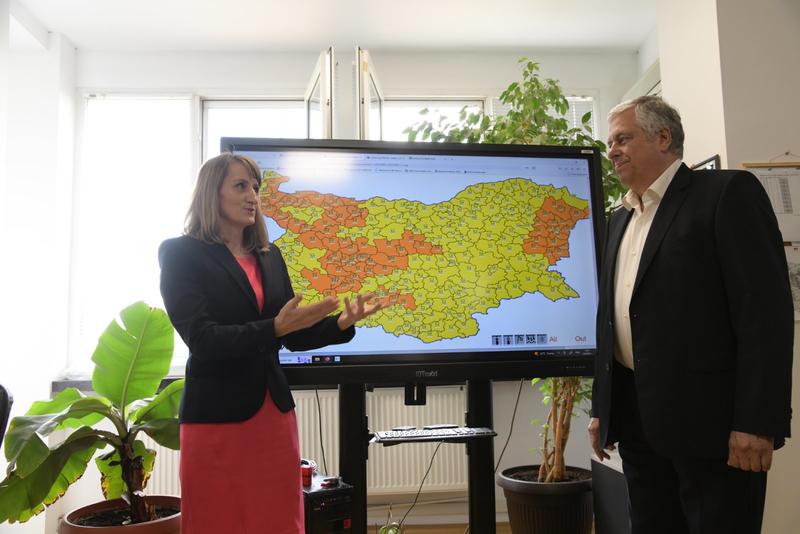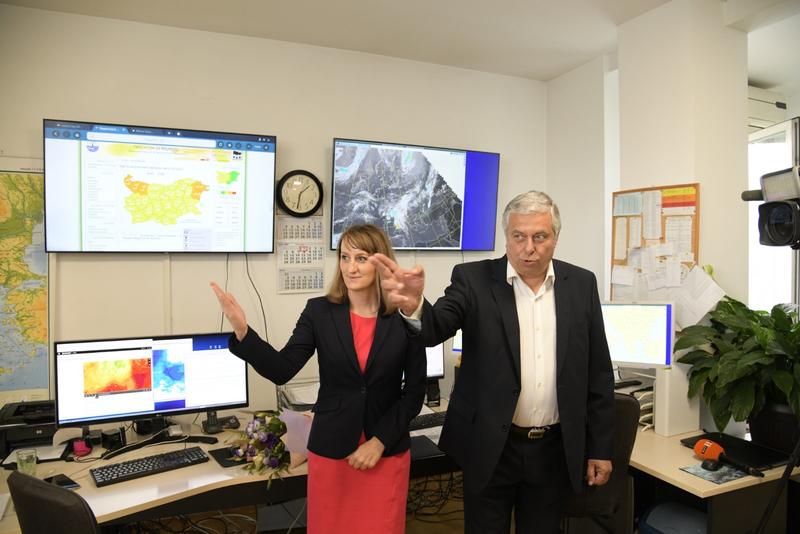Minister Karamfilova: NIMH can now predict dangerous phenomena in every single municipality
01 Sep, 2022 | 16:08
The National Institute of Meteorology and Hydrology (NIMH) can now forecast dangerous phenomena such as strong winds, extremely high or low temperatures, storms, heavy rainfall not only at the level of districts, but also for each of the 265 municipalities on the territory of Bulgaria. This was announced today by the Minister of Environment and Water Rositsa Karamfilova, who together with the Director General of NIMH Prof. Hristomir Branzov presented the updated early warning system for dangerous hydrometeorological phenomena “Meteoalarm” developed for the territory of the Republic of Bulgaria and Europe.
The technology has been under development since April 2021 under the project “National Geoinformation Center” funded by the Council of Ministers’ National Science Infrastructure Roadmap with approved NIMH funding for the development of the Meteoalarm system. The project was implemented by scientists and specialists from the Institute.
“The system is extremely important not only for us as a ministry, it is also of national significance - professionals at the Institute have the task of providing timely, quality, and adequate information to the public, state institutions, and municipal authorities to enable prevention and warning of the risk of disasters,” said Minister Karamfilova. She added that the updated system works thanks to the efforts by the Institute, but also thanks to the provided additional funding to pay NIMH’s membership fee in EUMETSAT, where it is a member based on an intergovernmental agreement.
Prof. Brunzov explained that the amount of over 330,000 BGN was needed to supplement Bulgaria’s membership fee for this year in EUMETSAT - the European Organization for the Operation of Meteorological Satellites. “One of the sources that feed the Meteoalarm system is satellite information. The system was developed for 3-4 years. In May a test version was ready, but we did not have the funds needed for the membership fee so as to receive the satellite information. As of today, the upgraded system is operational and enables much higher spatial resolution in monitoring,” he said.
Interrupting NIMH’s participation in the European organization is a risk for the state, Minister Karamfilova said. She explained she was familiar with the case at the beginning of her term in office.
“With my team and the support of the government, we ensured the sustainability of the actions by securing the necessary funding,” explained the minister. She added that the availability of detailed data is of great added value for informing local governments and citizens in a timely manner. “Now the system will be much more effective in respect to prevention by state and municipal structures and much more informative for citizens, when dangerous phenomena occur,” added Minister Karamfilova.
NIMH meteorologist Anastasiya Stoycheva demonstrated how the system provides weather forecasts with warnings by municipalities.
Additional information about the “Meteoalarm” system - NIMH (Meteoalarm)
“Meteoalarm” is a unified European early warning system for dangerous hydrometeorological phenomena. The service is aimed to be of service to the institutions, citizens, and businesses. It covers a range of weather elements such as high winds, extreme high and low temperatures, storms, heavy rainfall, snow and ice, fog, as well as conditions that could lead to increased risks, such as high waves, wildfires, and avalanches. It is maintained by 31 national weather services that prepare and send information to the system’s servers on a daily basis. The warnings are provided for two days in advance. They are given in four levels - in color (green, yellow, orange, red), event symbol, and event values - you can see more at https://www.meteoalarm.org/en/
The system is maintained by the organization EUMETNET (Network of European Meteorological Services), founded in 1999 and headquartered in Brussels, Belgium. It provides a framework for organizing cooperative programs among its members in the fields of meteorology, data processing, and weather forecasting. Bulgaria, through NIMH, has been a member since 2010.
During the transition of the Institute from the Ministry of Education and Culture to the Ministry of Environment and Water in March 2022, the NIMH budget was not able to cover Bulgaria’s membership fee to EUMETSAT for 2022. After NIMH paid the membership fee to EUMETSAT in August 2022, the updated “Meteoalarm” was put into exploitation by NIMH.


